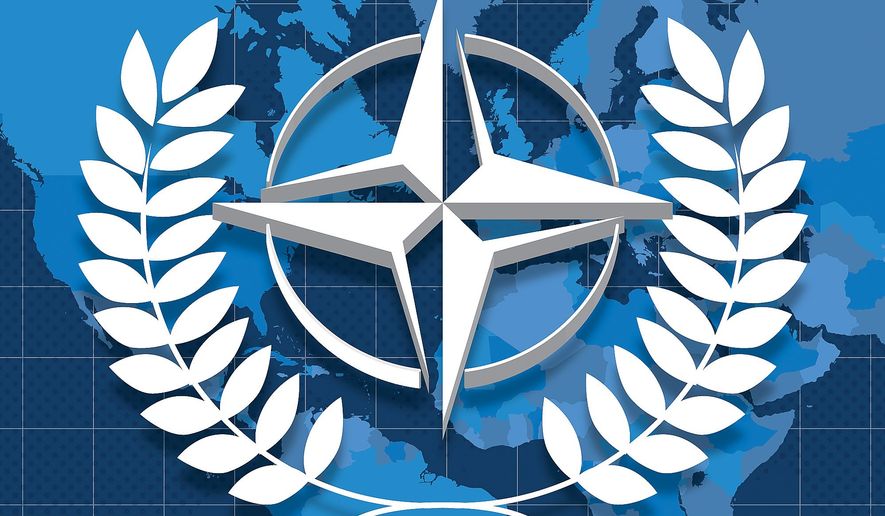OPINION:
At their summit last month, President Biden and the assembled leaders of NATO countries pledged over $40 billion in military assistance to Ukraine next year and agreed the Western military alliance would assume responsibility from the U.S. for coordinating the provision of military equipment and training.
NATO also issued a declaration calling out China as the “decisive enabler” of Russia’s war in Ukraine, a role that puts the rest of Europe at risk. Still not done, the NATO leaders gathered in Washington also took aim at Iran and North Korea, criticizing them for providing the Kremlin with military support for its unjust war in Ukraine.
The summit thus marked the first time the alliance had so publicly and explicitly confronted the new “axis of tyranny” — the deepening collaboration between Russia, North Korea, China and Iran that seeks to overthrow the U.S.-led liberal international order.
Helping Ukraine continue its existential defense against Russia’s unprovoked invasion, NATO members have provided over $100 billion in financial, military and humanitarian assistance to Ukraine. The U.S. has, by comparison, spent roughly the same amount, a sizable portion of which has come back to bolster America’s own industrial base by funding domestic defense manufacturing.
Twenty of the 32 NATO members are now spending more than 2% of their gross domestic product on national defense, the benchmark target. Poland now spends over 4%, which is greater even than the percentage spent by the U.S.
If there’s a silver lining to Russia’s invasion of Ukraine, it’s the revitalization of NATO, for which we can thank President Volodymyr Zelenskyy and the brave Ukrainians who are defending their country from the Kremlin’s onslaught. Russian President Vladimir Putin and Chinese President Xi Jinping are proponents of a “multipolar world.” They see alliances such as NATO as an adversarial bloc because they know that, absent collective security, they can take advantage of smaller, weaker nations to impose their will militarily and commercially.
That’s why Russia invaded Georgia in 2008 and Ukraine in 2014. Likewise seeking to create a regional sphere of influence, China aggressively seeks control of the South China Sea while threatening to take over Taiwan.
Mr. Putin and Mr. Xi have NATO in their crosshairs precisely because it so effectively deters their aggression, unites democracies and demonstrates the superiority of free-market economies.
For 75 years, NATO’s collective security system has maintained peace in Europe, a matter of critical importance to U.S. national security. The United States and Europe engage in over $1 trillion in annual trade. U.S. direct foreign investment in the European Union is $3 trillion, and Europe has invested over $2 trillion in the U.S. Our economies, intertwined to our great mutual benefit, would suffer mightily in the event of another destructive land war in Europe.
With the U.S. facing several complex national security threats, there is no time like the present to bolster strong bipartisan commitment to NATO along three lines of operation.
First, the U.S. and our NATO allies need to continue to engage in a robust exchange of intelligence, a force multiplier for protecting our nations. Adversaries often target NATO members simultaneously, with planning and financing occurring in multiple countries. Recently, the U.S. reportedly detected an Iranian plot to assassinate former President Donald Trump, which should be met with a full-court press by NATO to collect follow-on intelligence. Germany recently stopped a Russian plot to assassinate the CEO of an arms manufacturer. We need to continue to detect and preempt those Russian hybrid operations.
Second, the U.S. needs to rebuild its defense industrial base so that we can once again be the “arsenal for democracy” in support of our NATO allies. Heading off threats with effective deterrence, along the lines of President Ronald Reagan’s “peace through strength” approach, is the best way to avoid ruinous wars in the long run.
Third, China, Russia, North Korea and Iran are testing our vulnerabilities and are poised to launch military action whenever and wherever they believe they can succeed. NATO’s Article 5, requiring member states to come to the assistance of any member state subjected to an armed attack, has been invoked only once — after the Sept. 11 terrorist attacks on American soil. We have had no need to invoke Article 5 at any other time in NATO’s 75-year history precisely because strong bipartisan support for NATO has made it clear to our adversaries that they would pay too high a price for testing our resolve.
Reagan’s proclamation 40 years ago that the NATO alliance represents “a living commitment of the nations of the West to the defense of democracy and individual liberty” should continue to be the blueprint for U.S. policy and public statements.
• Daniel N. Hoffman is a retired clandestine services officer and former chief of station with the Central Intelligence Agency. His combined 30 years of government service included high-level overseas and domestic positions at the CIA. He has been a Fox News contributor since May 2018.




Please read our comment policy before commenting.